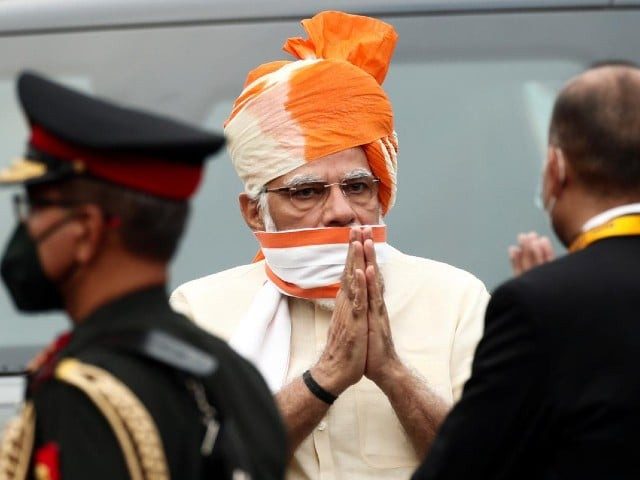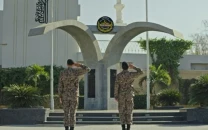Modi is a threat to India’s unity
Sweden-based expert on peace and conflict criticizes the BJP leader over his policies in Kashmir and towards Muslims

Prime Minister Narendra Modi's Hindu-nationalist agenda, the vilification of religious minorities, and his foreign misadventures will light a fuse of internal chaos in India, and possibly drag the largest democracy into an unnecessary regional conflict.
In a no-holds-barred interview, Ashok Swain, a professor of Peace and Conflict Research at Uppsala University, flatly called Modi out on a litany of gaffes, including Kashmir and his policies towards India's 200-million strong Muslim community.
"Modi has adopted the philosophy of majoritarianism in India. He wants to create a Hindu nation for Hindus only," cautioned Dr. Swain in an interview from Sweden, where he is based.
Under Prime Minister Modi, Dr. Swain said, India is swiftly moving towards a dictatorship. "The country is less secular and democratic than it ever was," said the Uppsala University professor. "India is inching closer to dictatorship. Make no mistake, elections also create dictators, and India is no exception.”
Even while he is far away from India, where he grew up in rural surroundings, Dr. Swain keeps a close eye on the rapidly weakening social fabric of his native country. Modi, he warned, is a serious threat to India's unity and existence. "Due to the prime minister’s policies towards minorities, India is likely to experience more civil unrest and even sectarianism."
The UNESCO Chair of International Water Cooperation, who has been teaching at the oldest university in Sweden and all of the Nordic countries for over two decades said, India's global ambitions are intricately linked to its domestic and regional performance. "The economy is not doing well. India cannot be a theocratic state and be a regional power at the same time," he said. "The process of creating a Hindu state will create room for internal secession and power struggles," the professor warned.
Narendra Modi, who gradually climbed the leadership ladder of the Bharatiya Janata Party or BJP, has been spreading an us-versus-them philosophy throughout his political career. "In a country that is already rived by dangerous communal divisions, such ideology can only cause more harm," said Dr. Swain. Since his election in 2014, the perennial rift between Hindus and Muslims has revived and only deepened.
"According to Modi, Hindus have been suppressed by different groups, and the time has come to restore the community's glory. This is a misreading of history," said Dr. Swain, adding they are trying to modify the history of India and blaming Muslims for political gains.
"India's 200 million Muslims are the main target of hate, and then the Sikhs, Christians, and Dalits. This is an upper caste Hindu project that is being strengthened to keep segregation alive in India," said Dr. Swain. "Instead of moving forward, India is refusing to abandon the medieval ideology," he quipped.
Dr. Swain said the Indian Prime Minister has no love for India's minorities, particularly Muslims. The Indian leader, the professor said, comes from the Rashtriya Swayamsevak Sangh (RSS), a Hindu-nationalist social movement that has known ties with him and the ruling Bharatiya Janata Party.
"In the RSS parlance, Modi is a true Pracharak. He needs to act like India's Prime Minister and not like a fundamentalist,” said Dr. Swain, who hails from Puri, India. "He wants to create a Hindu Rashtra to please his base," he added.
Kashmir crisis
Describing it as a self-inflicted wound, Dr. Swain criticized the Modi government for its August 5, 2019 actions in occupied Kashmir.
When asked to propose a possible solution for Kashmir, Dr. Swain said, India needs to restore the occupied Valley’s special status and initiate dialogue with Pakistan.
"Modi benefits from the violence and unrest in Kashmir. It fits perfectly into the Hindutva narrative that paints Muslims as terrorists and villains," said Dr. Swain, explaining the policies employed by the BJP government in occupied Kashmir.
Shortly after India revoked Kashmir's quasi-autonomous status, its actions triggered an uprising in the Muslim-majority state. To suppress the struggle for freedom in the occupied Valley, the Indian government imposed a punishing blockade. The regime in New Delhi deployed troops and placed eight million Kashmiris under a virtual house arrest with limited access to phonelines and internet.
Dr. Swain believes the strategy of oppression employed against the eight million Kashmiris helps the Modi government dilute the increasing criticism over domestic failures in mainland India. "Targeting Kashmiris and creating anti-Kashmir slogans helps them cover their domestic failures," he said. "If things get normal in Kashmir, Modi will not be able to justify his theory that Muslims can live peacefully in India," said Dr. Swain.
Modi, he said, does not consider Kashmiris as Indian citizens. "Modi wants Kashmir to be part of India, but he does not see Kashmiris as Indian citizens." "For him, Kashmiris are villains and anti-peace," he added. The Hindutva ideology, Dr. Swain said, is a criminal project that has existed for decades. "It has only expanded under Modi," he added.
Dr. Swain, who also heads the Research School of International Water Cooperation at Uppsala University said, Kashmir is not a domestic issue. "It never was," stated the professor, who is known for being a vocal critic of the Modi government's policies. His views on Twitter routinely annoy uncompromising followers of the Indian Prime Minister.
"If a Kashmiri Muslim throws a stone, he is called a terrorist, if a UP Brahmin kills eight police officer, he is called a gangster," said Dr. Swain in a volley of tweets fired off last month.
China and the region
In the hour-long interview, Dr. Swain also took a jab at India for its misadventures in the region.
Dr. Swain said the recent escalation between Indian and Chinese troops was unnecessary. The situation in Ladakh, he said, brought the two nations closer to near-lethal blows.
Dr. Swain candidly termed the tensions with Beijing as another faux pas, that has inadvertently made China a direct stakeholder in the regional crisis.
"After what happened in Ladakh, China is perhaps closer to Pakistan on the Kashmir issue than it ever was," he said. The incident, he said, has fractured the already delicate relationship between Beijing and New Delhi.
He pointed out that India's open alliance with the United States, its support for groups that are against Beijing's interest, and Modi's failed attempt to change Kashmir's political and geographical map, have collectively provoked China's ire.
China, he said, has successfully isolated India in the region. "India needs China more than China needs India economically, politically, and diplomatically," claimed Dr. Swain.
The conflict with China, Dr. Swain said, has also torpedoed India's bid for the permanent membership of UNSC. "Without China's approval, India cannot be a permanent member of the UNSC," he stated. "Together Pakistan and China have a stronger position on Kashmir than India," said Dr. Swain, who believes that the change in regional dynamics will play against Modi's agenda.
From Balochistan to Balakot
During the wide-ranging interview, Dr. Swain also shared his views on India's intervention in Balochistan, which is Pakistan's largest province.
"Modi's open support for elements that have caused unrest in the province was another misstep," said Dr. Swain, referring to an Independence Day speech delivered by the Indian Prime Minister four years ago.
"Modi's comments were a clear breach of all diplomatic norms," said Dr. Swain. "The Indian Prime Minister needs to understand Balochistan is not Bangladesh. And his actions could trigger a conflict between the two nuclear nations,” warned the Sweden-based professor.
In 2019, he said, India made another blunder by claiming it had destroyed a terror camp near Balakot in northern Pakistan. "The Balakot attack was another disaster by the Prime Minister of India, and it was fueled by election-year nationalism," said Dr. Swain. The Sweden-based professor described the sabre-rattling by Modi as a political gimmick for domestic consumption. "Why wasn't the footage released by the Indian government after the attack?" questioned Dr. Swain. “The Indian government should have released the evidence. Instead, they relied heavily on propaganda weaved by the media.”
On the other hand, photographs released by Pakistan showed minor damage in a forested area from Indian airstrikes. Capping the humiliating episode, Pakistan also captured an Indian pilot, who was later released as a peace gesture. In Dr. Swain's opinion, that was a wise move by the government in Islamabad. "Pakistan did the right thing. It went for de-escalation."
Lauding Islamabad's composed response, he said: "Pakistan acted like a civilized state and returned the pilot. India could have reciprocated and used the thaw in tensions to normalize ties." "But it didn't," he added.
India's support abroad
Indian government and in particular the RSS, a right-wing group associated with Modi, Dr. Swain said, is actively supporting individuals who plan to run for public office in western capitals.
Referring to Srinivas Rao Preston Kulkarni, an American diplomat, and politician who is the Democratic nominee for Texas's 22nd congressional district in 2020, Dr. Swain said, the RSS is supporting candidates like Kulkarni because they know he might end up joining the powerful foreign relations committee.
"The international wing of the RSS wants to place individuals like Kulkarni in a position where they can defend India's position on Kashmir and even dilute the criticism for its actions in the Valley," said Dr. Swain.
Dr. Swain also took a potshot at US President Donald Trump, who has exposed himself as an ally of the Indian leader. "Once leaders like Trump are gone, you will notice Modi has little protection against criticism." But support for India's actions in Kashmir, Dr. Swain said, is waning and sooner rather than later, Modi will realize that.
The road forward
According to Dr. Swain, who routinely invites criticism from Modi's online supporters on Twitter, the Indian Prime Minister needs to abandon the divisive rhetoric. "His actions in Kashmir and against Muslims in India will have far-reaching consequences," said Dr. Swain in a veiled warning to the BJP leader.
While Kashmir is a unique situation, he cautioned, India is vulnerable to the threat of secession.
"The cry for an independent Sikh state is getting louder. Other freedom movements in India are also gaining momentum," claimed Dr. Swain.
The Sweden-based academic urged Modi to abandon the politics of the 1940s, 50s, and 60s. "The dynamics have changed and with a stronger China in the region, India cannot afford further isolation," he said.
"India must start a constructive dialogue with Pakistan to resolve the Kashmir issue. And if that is not possible, it must engage a neutral mediator to break the ice," advised Dr. Swain. “Dialogue is the only way to resolve the Kashmir issue.”
India under Modi's leadership, he said has abandoned the ideology of Mohandas Gandhi, who believed in inclusion and not segregation. The country, he insisted, must respect its constitutional promises to minorities and not fall for Modi's rhetoric that links Muslims, Kashmir, and Pakistan to all of India's problems.



















COMMENTS
Comments are moderated and generally will be posted if they are on-topic and not abusive.
For more information, please see our Comments FAQ